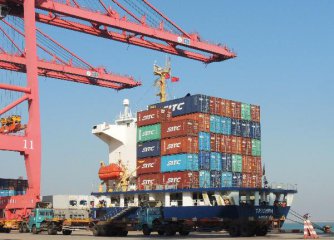Japan logged a goods trade surplus of 496.2 billion yen (4.46 billion U.S. dollars) in October, the Finance Ministry said in a preliminary report on Monday.
According to the ministry, exports declined 10.3 percent compared to the same time a year earlier in the reporting period, with median market expectations projecting an 8.5 percent fall, with the decline coming on the heels of a 6.9 percent drop in September and marking the 13th straight month of decline.
"Japan's weakening exports reflected sluggish growth in global trade. In addition, a firming yen negatively affected exports by reducing price competitiveness of Japanese products," Toru Suehiro, a senior market economist at Mizuho Securities Co., was quoted as saying.
Imports, meanwhile, retreated 16.5 percent on a customs-cleared basis, ahead of median analysts' expectations for a 16.6 percent retreat.
It is the second-successive month that Japan's balance sheet has posted a trade surplus, as the value of imports continue to decline at a quicker rate than those of exports, with shipments, notably, dropping in the recording period, having marked a retreat every month in the year past.
This, economists have said, is owing to a comparatively high yen and both slumping domestic demand and overall economic malaise weighing on the balance sheet and impeding Japan's progress, despite numerous measures by the central bank and government to stimulate expenditure and attempts to kickstart new socio-economic growth drivers.
A firm yen negatively impacts companies widely exposed to overseas markets and exporters generally rely on a weak yen to increase their overseas profit margins on favorable exchange rates and see the yields repatriated augment on favorable currency rates.
"Exports were down due to drops in autos, steel and communications equipment," Yuichiro Nagai and Kyohei Morita of Barclays Securities Japan were quoted as saying prior to the release of the latest data set.
While Tsutomu Saito, an economist at Daiwa Institute of Research, suggested that, "Considering seasonal factors, it's a pretty high trade surplus," adding, "Energy prices might pick up, but to compensate import volume is down, and export volume is increasing modestly."
The data showed that as the yen rose 14.7 percent in the reporting period compared to the same time a year earlier, to an average 102.40 yen per U.S. dollar, exports to China dropped 9.2 percent to 1.07 trillion yen (9.65 billion U.S. dollars), marking the eight straight month of decline, while imports tanked 17.9 percent to 1.42 trillion yen, down for the seventh straight month.
Shipments from here to the United States, meanwhile, declined 11.2 percent to 1.20 trillion yen, marking the eight straight month of decline, the ministry said, while imports dropped 9.9 percent to total 616.82 billion yen, down for the eighth straight month, the government data showed.
Exports to the European Union, meanwhile, fell 9.5 percent to 650.49 billion yen, while imports retreated 12.0 percent to 674.89 billion yen, marking the eight straight month of rise.
In general, market insiders believe that in the short-term the "Trump effect" as refers to the potential near-term upticks based on U.S. stimulus and growth potential when the new leadership in the U.S. takes over, may work favorably for Japan's balance sheet, although the consensus remains that the mid-to-long-term outlooks remain entirely hazy.
The latest trade data set underscores a fragile economic expansion in Japan in the third-quarter, as exports rallied and imports declined, which emphasizes the massive interdependence of the nation's movement of goods in and out of the country, particularly the former, against a backdrop of sluggish global and domestic demand and increase competition from other countries for electronic and auto products, previously the sole domain of Japan and its high-tech know-how.
"Slowing trade growth is a concern for the global economy, while rising protectionism increases such worries," as global economic growth remains weak amid low productivity and slow wage growth, Suehiro said.
One positive, however, the finance ministry said Monday, was the fact that net shipments, which subtracts imports from exports, added 0.5 percentage point to GDP growth in the last quarter.




















Latest comments